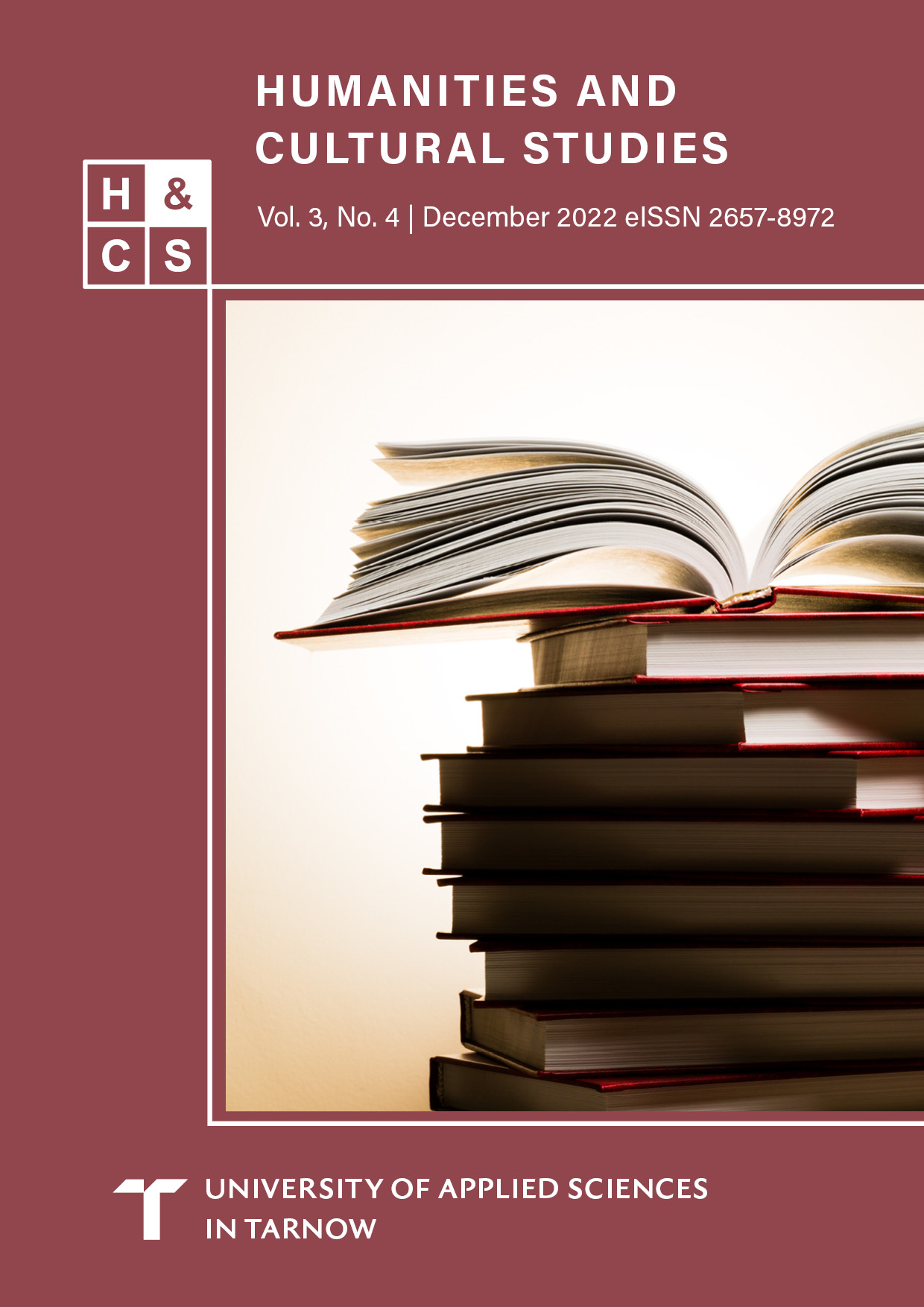Internationalisms in literary vocabulary in Lithuanian, Icelandic, Finnish and Hungarian
DOI:
https://doi.org/10.55225/hcs.439Keywords:
literary terminology, internationalisms, Lithuanian, Icelandic, Finnish, HungarianAbstract
The article presents literary terminology in four languages (Lithuanian, Icelandic, Finnish and Hungarian) against the background of the development of their standard and the formation of scientific terminology in the 19th century, within romantic nationalism. All four languages have developed their national identities under similar historical circumstances that influenced their more or less purist attitude towards accepting foreign words into their vocabulary. And since there are many words of Greek-Latin origin in the international literary terminology, we check how many of them are used in the chosen languages nowadays.
Downloads
References
Bart I., La Hongrie et les Hongrois, trad. C. Defourny, A. Fáber, Budapest 2005. Google Scholar
Bernharðsson H., Spreading the standard : The nineteenth-century standardization of Icelandic and the first Icelandic novel, « Journal of Historical Sociolinguistics » 2018, vol. 4(2), p. 149–176. DOI: https://doi.org/10.1515/jhsl-2017-0014 Google Scholar
Keinys S., Maironis ir mūsų literatūros mokslo terminologija, « Terminologija » 2002, vol. 9, p. 26–54. Google Scholar
Kristinsson A.P., A. Hilmarsson-Dunn, Implications of language contact: Evaluating the appropriateness of borrowings in written Icelandic, [in :] New Trends in Nordic and General Linguistics, ed. M. Hilpert et al., Berlin 2015, p. 55–67. DOI: https://doi.org/10.1515/9783110346978.55 Google Scholar
Kvašytė R., Lietuvių ir latvių stilistikos terminija gretinamuoju aspektu, [in :] Lietuvių ir latvių gretinamosios stilistikos klausimai, réd. R. Kvašytė et al., Šiauliai 2006, p. 54–63. Google Scholar
Laitinen K., Suomen kirjallisuuden historia, Helsinki 1981. Google Scholar
Lehikoinen L., S. Kiuru, Kirjasuomen kehitys, Helsinki 2001. Google Scholar
Mitkevičienė A., Epo, lyrikos, dramos žanrų ir kitų klasifikacijos vienetų pavadinimai pirmuose lietuviškuose literatūros teorijos vadovėliuose, « Terminologija » 2005, vol. 12, p. 81–106. Google Scholar
Mitkevičienė A., Figūrų ir tropų pavadinimai 1918–1940 m. literatūros mokslo darbuose, « Terminologija » 2014, vol. 21, p. 176–191. Google Scholar
Mitkevičienė A., Lietuvos Nepriklausomybės Akto signataras : Kazys Bizauskas ir lietuvių literatūros mokslo terminija, « Terminologija » 2018, vol. 25, p. 201–234. Google Scholar
Mitkevičienė A., Sinoniminiai terminai 1918–1940 metų lietuvių literatūros mokslo darbuose, « Lietuvių Kalba » 2015, vol. 9, p. 1–23. DOI: https://doi.org/10.15388/LK.2015.22632 Google Scholar
Mitkevičienė A., Terminologijos komisijos (1921–1926) vaidmuo lietuvių literatūros mokslo terminijos istorijoje, « Terminologija » 2013, vol. 20, p. 172–179. Google Scholar
Mitkevičienė A., V. Dubo visuotinės literatūros vadovėlio terminų variantai, « Terminologija » 2004, vol. 11, p. 119–144. Google Scholar
Ólafsson V., Hugtök og heiti í bókmenntafræði, « Orð og tunga » 2009, vol. 11, p. 101–116. Google Scholar
Piročkinas A., Jonas Jablonskis (1860–1930) et le réveil de la langue lituanienne, « Cahiers Lituaniens » 2003, vol. 4, p. 23–30. Google Scholar
Rapak W., La littérature, la littérarité et le littéraire : (entre « Qu’est-ce que la littérature ? » essentialiste et « Quand est-ce de la littérature ? » conditionaliste). P. 1, « Romanica Cracoviensia » 2004, vol. 4, p. 119–136. Google Scholar
Rapak W., La littérature, la littérarité et le littéraire : (entre « Qu’est-ce que la littérature ? » essentialiste et « Quand est-ce de la littérature ? » conditionaliste). P. 2, « Romanica Cracoviensia » 2005, vol. 5, p. 189–203. Google Scholar
Vikør L., Language purism in the Nordic countries, « International Journal of the Sociology of Language » 2010, vol. 204, p. 9–30. DOI: https://doi.org/10.1515/ijsl.2010.028 Google Scholar
Wahl B., Isländisch : Sprachplanung und Sprachpurismus, Heidelberg 2008. Google Scholar
Zinkevičius Z., The history of the Lithuanian language, Vilnius 1998. Google Scholar
Choix de dictionnaires et sources terminologiques Google Scholar
Benediktsson J., Hugtök og heiti í bókmenntafræði, Reykjavík 1983. Google Scholar
Hosiaisluoma Y., Kirjallisuuden sanakirja, Helsinki 2003. Google Scholar
Literatūros terminų žodynas, Vilnius 1962. Google Scholar
Rapola M., Sanastomme ensiesiintymiä Agricolasta Yrjö-Koskiseen, Helsinki 1960. Google Scholar
Szathmári I. (szerk.), Alakzatlexikon : A retorikai és stilisztikai alakzatok kézikönyve, Budapest 2008. Google Scholar
Szily K., A magyar nyelvújítás szótára, Budapest 1902. Google Scholar
Tieteentermipankki, https://tieteentermipankki.fi [accès : le 31 juillet 2022]. Google Scholar
Tótfalusi I. (szerk.), Magyar etimológiai szótár, Budapest 2004, https://www.arcanum.com/hu/online-kiadvanyok/Lexikonok-magyar-etimologiai-szotar-F14D3/ [accès : le 29 juillet 2022]. Google Scholar
Suomen sanojen alkuperä, Helsinki 1992. Google Scholar
Trésor de la Langue Française informatisé, https://www.cnrtl.fr/definition/ [accès : le 28 juillet 2022]. Google Scholar
Visuotinė lietuvių enciklopedija, https://www.vle.lt/ [accès : le 31 juillet 2022]. Google Scholar
Zaicz G. (szerk.), Etimológiai szótár, Budapest 2006. Google Scholar
Downloads
Published
How to Cite
Issue
Section
License
Copyright (c) 2023 Iwona Piechnik

This work is licensed under a Creative Commons Attribution-NonCommercial 4.0 International License.





